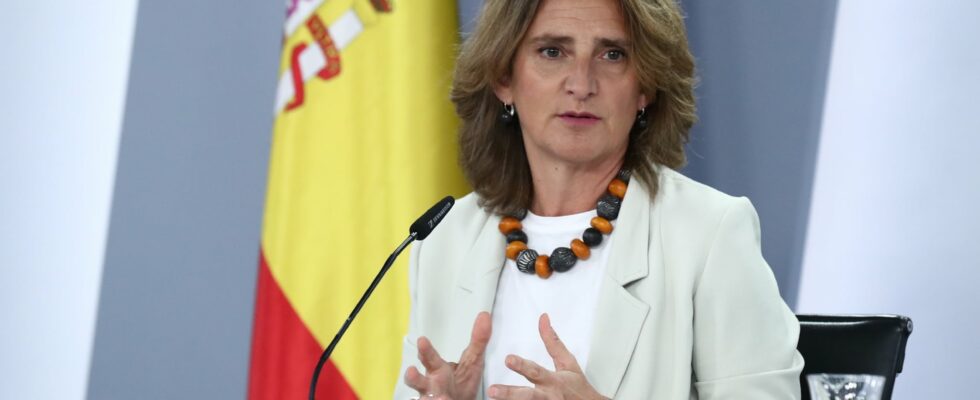Criticizing the choices of your potential future boss is not the best way to ensure your future. Except perhaps in the very unique world of European politics. Last May, Teresa Ribera criticized Ursula von der Leyen’s “extremely pernicious attitude of resignation” regarding the European Green Deal. The Spanish Minister for Ecological Transition feared that the latter, fiercely opposed by the extreme right, would fall victim to the Commission President’s maneuvers to ensure her reappointment at the head of the European executive after the elections scheduled for June.
Today, however, the 55-year-old socialist is tipped for a choice position: to take the lead in the European Union’s environmental policy with, it seems, an expanded portfolio, which could combine green and digital transition. And even a vice-presidency, the cherry on the cake hoped for by Madrid? The matter must still be confirmed by Ursula von der Leyen in the middle of the week. This choice, if it is proven, risks making some teeth grind. “She had some harsh words against von der Leyen, but the college of commissioners will have to get used to her saying things as she thinks them. She does not have this political side of wanting to please everyone and always make herself likeable,” notes Gonzalo Escribano, head of the Energy and Climate program at the Royal Elcano Institute.
“A vigilant trust”
Teresa Ribera also carries an anti-nuclear label. This earns her the wary gaze of countries that are banking on nuclear power, such as France, and of those who have already rubbed shoulders with the senior civil servant. “We have a certain number of disagreements and we fought hard during the reform of the electricity market”, finalized at the end of 2023 under the Spanish presidency of the EU, recalls MEP Christophe Grudler (Renew), president of the parliamentary intergroup on nuclear power.
On this electricity issue, France had won its case in the final stretch of negotiations, after heated exchanges with Germany: nuclear power would be able to benefit from contracts for difference (a long-term contract signed between the State and an electricity producer committing the former to compensate the latter’s losses) in the same way as renewable energies. The arbitrator Teresa Ribera, pragmatic, had managed to close the debate. “She is capable of reaching compromises and giving up principles that she believes are good for Spain, because she considers that this is the best possible result for the continent. She is a convinced pro-European,” describes Gonzalo Escribano, who knew her before she entered politics, within the socialist government of José Luis Zapatero (2008-2011).
Christophe Grudler praises “a competent person”, who brings interesting expertise on many subjects – water management for example – and who could be useful for all countries. The MEP warns however that the “anti-nuclear dogma has no place in this position. We will give him vigilant confidence and will watch his answers before Parliament. And if the actions do not follow, we will go to the front”.
As she did for the electricity market, Teresa Ribera will have to find a balance between her personal opinions and the line defended by Brussels, which has made a real shift on the subject. “She has strong convictions but is not maximalist in her positions,” says the Spanish expert. And if it was still necessary to give assurances to the defenders of nuclear power, Ursula von der Leyen could appoint, as is expected, the Czech Josef Síkela to Energy. “This would be seen as a gesture for European countries that want to keep nuclear power in their energy mix,” analyzes Coralie Laurencin, senior director at S & P Global, specializing in energy and climate policies.
“Outstanding negotiator”
With the Twenty-Seven having diverse interests, the pursuit of the Green Deal will not be a long, quiet river. Particularly on the agricultural side. Spain has not been spared by the tensions that shook Europe at the beginning of the year. Nor has Teresa Ribera, who was strongly criticized by the sector. Seeing the future of the minister at the Commission taking shape, the president of the Spanish young farmers’ union repeats over and over again his wish to see her “as far away as possible from the place where she can make decisions affecting agriculture.”
To close sensitive cases, the lawyer by training will have to deploy her “unparalleled negotiating skills”, praised by several observers. “She is stubborn and very attentive to positions, especially on issues of social justice”, praises Sébastien Treyer, her successor at the head of the Institute for Sustainable Development and International Relations in Paris, which she directed from 2014 to 2018. He spontaneously mentions her role in limiting the damage to miners in northern Spain at the time of the closure of coal-fired power stations, but above all, a few years earlier, her essential work during the global climate conferences for the recognition of the vulnerability of southern countries.
Because it was in the hushed corridors and during the endless COP meetings that she acquired a large part of her international recognition. To the point of eclipsing her number 1. Thus, during his first climate summit, Pedro Sánchez said that “everyone was asking who was next to Teresa”. Yet it was he, the president of the government, less visible than his loyal minister, who was already, in 2015, a prominent member of his “council of wise men” when he was fighting in the internal wars of the Socialist Party. Aware of Teresa Ribera’s value and her image on the climate scene, he has continued to promote her since coming to power in 2018. To the point of sending her into orbit in Brussels. “She is not a usual political figure”, admits Sébastien Treyer. At least that will be needed to manage the climate agenda of a European Union that is just as sensitive to external pressures as it is to (multiple) internal tensions.
.
